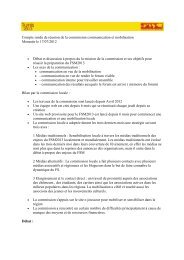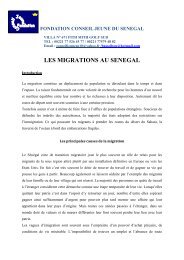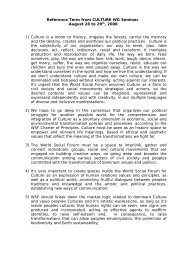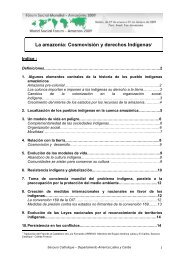Create successful ePaper yourself
Turn your PDF publications into a flip-book with our unique Google optimized e-Paper software.
Q&A: ‘It Is Time to Aim Beyond Capitalism’<br />
Alejandro Kirk interviews Walden Bello*IPS/TerraViva<br />
<strong>Press</strong> <strong>Report</strong> <strong>Europe</strong> <strong>WSF</strong> <strong>2009</strong><br />
BELEM, Brazil, Jan 26 (IPS) - The World Social Forum meeting this week in this city in Brazil’s Amazon<br />
jungle region has an urgent and crucial task: coming up with alternative solutions for the global crisis<br />
of capitalism now under way, and pushing for democratic control of the economy and state worldwide,<br />
Filipino academic, author and activist Walden Bello tells TerraViva editor Alejandro Kirk in this<br />
interview.<br />
IPS: In the context of the current global crisis, what is the World Social Forum’s (<strong>WSF</strong>) most relevant<br />
task?<br />
WALDEN BELLO: We are at a very critical historical juncture in which neoliberal capitalism is unravelling and I<br />
think that the <strong>WSF</strong> is a site where very serious discussions should be taking place, in terms of both anticipating<br />
what is the likely response of global capitalism as well as pushing forward alternatives to the current crisis. We<br />
must really put the task of the <strong>WSF</strong> in the context of the truly massive global crisis.<br />
IPS: So Belem is to be a crucial stage for the <strong>WSF</strong>’s future?<br />
WB: Yes, definitely. It would be extremely critical for global civil society at this point to respond to this crisis<br />
beyond the kind of stabilising solutions you are beginning to see in <strong>Europe</strong> and the United States.<br />
The capitalist elites are in many ways already going beyond neoliberalism, so I think on the one hand it is really<br />
important in Belem to come to a consensus about the crisis of capitalism and we ought to have very serious<br />
discussions on how to go beyond (such) solutions. I think we need to contend alternatives from within the<br />
system, like an expansion of social democracy for instance.<br />
IPS: How can the <strong>WSF</strong> come out with such a response and how could it possibly implement it?<br />
WB: What you really need to look at seriously, in Belem, is to identify not just a crisis of neoliberalism but a<br />
crisis of capitalism. We’re talking about the roots of the crisis being dynamic at the capitalist mode of<br />
production. The alternative to that is something we need to seriously come to grips with.<br />
We really need to frame our responses in terms of common universal values, like the question of justice, the<br />
question of equity, creating an alternative that really cares for the welfare of people. I think the discussion in<br />
Belem will really be very critical in terms of framing the alternatives.<br />
As for implementation, you really need to be quite innovative. We need to be looking at solidly linking our<br />
movement across different countries, interacting with respect to the alternatives that are being pushed. It can’t<br />
be easy, but this kind of sharing of experiences, creation of networks, sharing of ideas - I think this is something<br />
that the forum will play a very critical role at.<br />
IPS: In your writings you seem to avoid classical terms such as socialism, revolution and the like, to<br />
describe the kind of society the Forum should be looking forward to.<br />
WB: I do not so much shrink from articulating the alternative. We are looking at democratising the ownership of<br />
means of production. Whether you call that socialism or people’s democracy, or democratic socialism, what you<br />
are really talking about is democratic control of the economy.<br />
We need to be looking at the possible articulation of mixed economies, with different systems of ownership<br />
within the economy, which will probably include social enterprises, cooperatives, private enterprise and state<br />
enterprises.<br />
That’s one dimension. Another dimension is the question of refocusing on the internal economy, the domestic<br />
economy instead of export markets; national economic development. We would be talking about the critical<br />
importance of equity, fairly strong mechanisms of income and redistribution. And about an ecologically<br />
sustainable alternative. I don’t want to use the term socialism because there are certain connotations of what<br />
8








